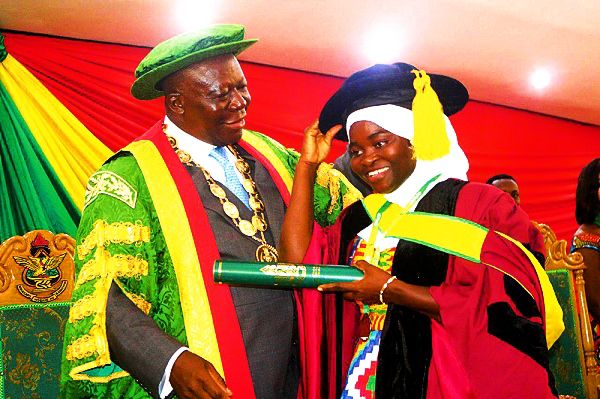
Act, statutes governing KNUST will not be compromised — Asantehene
The Asantehene, Otumfuo Osei Tutu II, has stated that the act and the statutes governing the Kwame Nkrumah University of Science and Technology (KNUST) will not be undermined under any circumstances so long as he remains the Chancellor of the university.
According to him, universities were established to run on regulations to make the academic space tolerable for all and that “order must be kept and rules followed to allow the 55,000 students (of KNUST) have a freedom to operate without intimidation”.
Advertisement
Speaking at a special congregation for more than 2,400 post-graduate students, including 38 PhDs, in Kumasi last Friday, Otumfuo Osei Tutu said: “Lewd male students’ behaviour in the presence of female students in the name of culture and tradition is not justifiable under any circumstances. Any culture that is not dynamic dies.”
Riots
Making reference to the October 22, 2018 riots by some students on the campus that led to the shut down of the university, the Asantehene said: “Whenever demonstrations have occurred, never have the students turned inwards and destroyed their own properties and those of the staff of the university.”
The violent demonstration led to massive destruction of school and private properties.
The rampaging students claimed the university’s management was high-handed in its decisions on them.
Following the riots, the university was closed down for some weeks.
The government also announced the dissolution of the Governing Council of the university, while the Vice-Chancellor, Prof. Kwasi Obiri-Danso, was asked to hand over the administration of the university, pending the outcome of investigations into the disturbances.
But the intervention of the Asantehene restored sanity, leading to the reopening of the university.
Committee on riots
At last Friday’s congregation, Otumfuo Osei Tutu announced the setting up of a three-member committee to probe the disturbances that rocked the KNUST.
The committee is chaired by a retired justice of the Supreme Court, Justice Rose Constance Owusu.
The Asantehene said the committee would start work immediately after its inauguration this week.
He said its report should help the university chart a course into the future “that will not make us repeat the embarrassing episode”.
He said the committee would be independent and given the freedom to do its work without any interference.
The Asantehene charged alumni of the university to harness their energies and time to galvanise financial and intellectual support for their alma mater, adding: “It will inure to the benefit of the university.”
Free SHS
Otumfuo Osei Tutu said from May 2020, the first batch of free senior high school (SHS) students would graduate and seek admission to the various tertiary institutions in the country.
According to him, the number of students seeking admission to tertiary schools could double and put pressure on existing facilities in the universities.
He, therefore, called on the government to, as a matter of urgency, complete all ongoing infrastructural projects at KNUST, particularly the teaching and research hospital at the university.
The project, which began in 2008, has delayed due to the lack of funds.
Vice-Chancellor
Prof. Obiri-Danso reiterated calls on the government to help expand facilities to strengthen research at the university.
He said KNUST, as the premier science university in Ghana, had produced most of the scientists in the country and that in sharing Ghana’s resources, “we are asking for equity to the universities and not equality”.
Reforms
The Minister of State in charge of Tertiary Education, Prof. Kwesi Yankah, called for reforms in the educational sector that would make it possible for Ghanaians to obtain PhDs at younger ages.
He said the prevailing trend of obtaining a PhD at an advanced age should give way to doctoral degree attainment in a modern society at a prime age.
According to him, that could be facilitated by the educational reforms which abolished the GCE Ordinary and Advanced levels and drastically reduced the average age of entering the university from 21 to 17.
“This should be followed by structural reforms in all graduate schools, including accelerated doctoral programmes where smart final-year undergraduate students are earmarked and soon put on accelerated doctoral programmes, as is done in several countries,” he suggested.
“Graduate training should, indeed, be expedited in areas of science and technology where Ghana’s future lies and where there is currently a greater deficit,” Prof. Yankah said.



